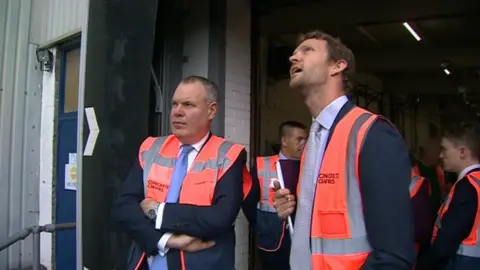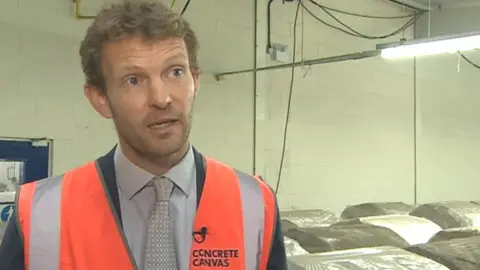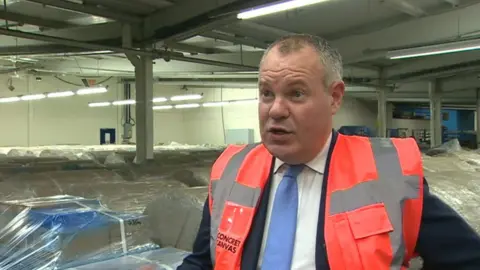Brexit: Welsh exporter doesn't buy UK government's optimism
 BBC
BBCWales' voice "will be heard" as the UK develops its post-Brexit world trade policy, according to a UK minister.
International Trade Minister Conor Burns MP said he was "very confident" the UK and the EU will strike a trade deal either before or after the latest Brexit deadline on 31 October.
He was speaking to the firm Concrete Canvas, during a visit to south Wales.
But the exporting company said there was a lack of detail around Brexit that was "very, very worrying".
Concrete Canvas, based in Pontyclun, Rhondda Cynon Taff, makes a fabric that when sprayed with water turns to concrete within 24 hours.
Although only around 6% of the firms's goods are exported to EU countries, it exports goods to 85 countries around the world in total.
As a member of the EU, the UK is automatically part of about 40 trade agreements which the EU has with more than 70 countries.
The UK wants to replicate these trade agreements but has only agreed "continuity" deals with 12 of the 40 countries and regions.

Peter Brewin, co-founder of Concrete Canvas said: "It seems unlikely in the next two months that the other 28 will be done.
"We are one of the most optimistic, can-do companies I've ever worked in. We would not be where we are if we did not have that approach.
"We are extraordinarily good at solving problems and getting stuff done but we do it in a planned way.
"We get the facts and the figures and we make decisions on the basis of evidence.
"And it is not confidence-inspiring when you have a government talking about 'everyone needs to be optimistic' without providing the information about what we can be optimistic about because, from where I'm looking at it, the facts and figures I look at, it is very, very worrying," he added.
Prime Minister Boris Johnson has said the UK will leave the EU on 31 October, with or without a deal.

Speaking during his Welsh visit on Wednesday, Mr Burns MP said: "We are aggressively preparing for the possibility that we will leave the European Union on the 31st of October without a deal.
"But it is of course worth stating that the prime minister has said that is not the desired outcome.
"But one of the reasons that we ended up with such a poor deal the last time we tried to negotiate this is that the other side didn't believe that we were serious about actually walking away with no deal and until they understand that we are prepared for it, we are, if necessary, up for it, the chances of coming to the table and getting a resolution that is in the interests of both sides is very small indeed."
Over a 15-year period, UK government analysis suggests the Welsh economy would be 8.1% smaller in the event of a no-deal Brexit than it would be if things stayed as they are.
The UK government's ambition of striking post-Brexit international free trade deals with countries such as the USA, Australia, China and India, is estimated to boost the economy by between 0.2-0.7% over the long term.
Asked if he recognised the difference between the figures, Mr Burns said: "Well, I am not as pessimistic.
"I was in the Treasury at the time of the referendum and I remember all the predictions of dire consequences for the very fact of voting to leave.
"It's [a no-deal Brexit] going to mean a change to the temporary trading relationship but I am very confident because it is patently in the interests of both the United Kingdom and of the European Union to do a deal in due course."
"I think the only question is do we get that deal before the 31st of October or do we get a comprehensive free trade agreement after the 31st of October," he added.
